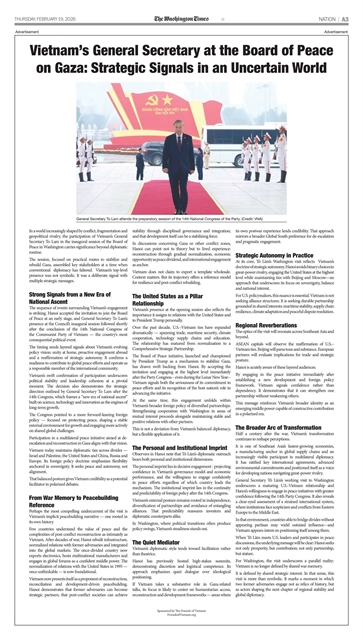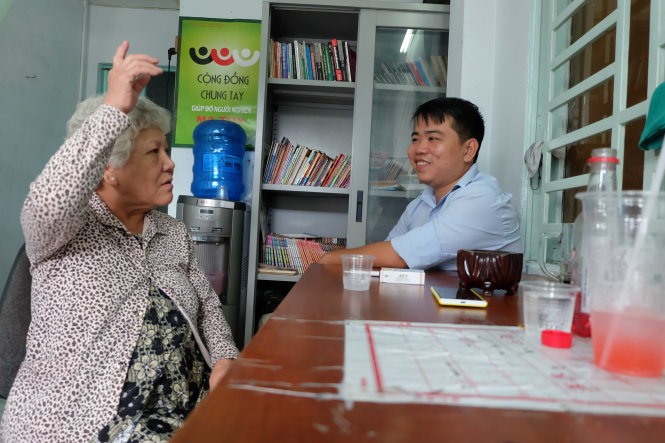 Society
Society

The 70-year-old mother Nguyễn Thị Minh Lê has the thought of “must worry and take care of two addicted children until she dies” when her battle to treat for two drug addicts seemed hopeless.
 |
| Peer educator Nguyễn Thị Minh Lê meets Lê Văn Hồ, an education official at Ward 8’s consulting room. — Photo Vũ Thủy |
Vũ Thủy
HCM CITY — To have one child, and then another, become drug addicts guarantees a life of suffering, a life of living on the edge.
At 70, Nguyễn Thị Minh Lê has garnered several lifetimes’ worth of experience in dealing with a hopeless situation.
She had resigned herself to taking care of two adult sons until her last breath. At the same time, however, she never stopped trying.
A resident of District 4 in HCM City, Lê said both her sons became drug addicts with the “The little brother following the older one,” she said in tears.
She remembers the village as a centre of drug addicts. Every family had at least one addict.
“This people-killing white powder (heroin) had come to every corner, like a plague,” she said.
When he was four, her older son dropped out of school, fell into bad company and became a drug addict. The family was broken, but worse was to follow. The second child, three years younger, took after his brother, and became an addict, too. The life of the mother collapsed.
“It is a nightmare when both children are addicted.”
The mother had to develop "three heads and six hands" to be able to survive. She woke up early, went to bed late, travelled to other provinces to purchase agricultural produce to sell in the city, aiming to save small sums of money that she could give to her two sons.
Her reasoning was simple.
"The two are very kind, but I was afraid they would steal from others, so I tried to make money for them.”
Meanwhile, she also took the two addicts to rehabilitation centres, and brought doctors home to treat them.
All this while, Lê had hopes that some day her sons would escape from their drug addiction. But these hopes diminished as she borrowed money from relatives, friends and neighbours, sometimes at usurious rates to keep the treatments going. She had to evade creditors by living temporarily in remote commune.
Then, time seemed to stop. There was a period when both sons got married and children were born as the sons did not relapse into drug use again.
Sadly, it did not last, and the relapse happened. The wives left, leaving behind their children, although they were just infants. The two addicts were admitted to drug treatment centres.
On her own, Lê took care of three children, 10 months, 20 months and 27 months.
After all the ordeals, a mother’s and grandmother’s love paying off, at least partially.
In 2006, the second son ended his two-year treatment at the Nhị Xuân Clinic, and found work as an electrician. He has remained drug-free since.
The older son remained addicted, so Lê had to take him to the city’s mandatory methadone treatment centre for addicts in 2012. This time, it worked.
The elder son found work, too.
For more than 10 years, there were several times that she felt like ending it all. “I wanted to die, but it is a mother’s love that forced me to wait until today.”
A few months after the rehabilitation of her eldest son, Lê Văn Hồ, an education official at Ward 8, came to meet Lê. He suggested that she works as a peer educator with the voluntary treatment programme for drug addicts.
She agreed. "As a mother of drug addicts, I understand the misery of parents and families having children who get addicted. If you take ten addicts to the treatment centre, eight return to using drugs again.”
“But, with the information I have, I still want to help everyone avoid the mistakes my two sons made.”
Despite having to deal with drug addicts again, Lê is very happy with what she is doing now.
At 70, she is in the consulting room of Ward 8 every day, to support addicts admitting themselves to the treatment centre and helps organise outdoor activities.
“She assists addicts with a mother’s love. Sometimes, she gives them small amounts of money,” said Hồ, the Ward 8 official.
For Lê, both two battles to take two sons back from addiction, and to help addicts were harder.
“Those who give up addiction successfully, I am happy. Those who relapse, I take them to other routes. I guide them to be treated with methadone or at compulsory rehabilitation centres,” she said.
One addict, a young woman, asked Lê recently to help because her mother, the only relative, was seriously paralysed and couldn’t vouch that her daughter would drink the methadone as required. Lê persuaded the doctor at the district’s treatment centre to allow the girl, standing as a guarantee herself.
Many addicts now see Lê as a life-saving benefactor.
N.V Trung, a local longtime drug addict, has been assisted with money many times by Lê to go to the treatment centre, but has relapsed every time. Lê was sad, but gave her love without reproach. As he talked with her, Trung cried a lot, and once again, she guided him to register for using methadone, and bought rice for Trung family.
Hồ said the local treatment programme faces many difficulties because there is a high rate of relapse after treatment.
“We, peer educators and drug addicts see the life of Lê as an inspiration to continue the fight against addiction,” he said. — VNS